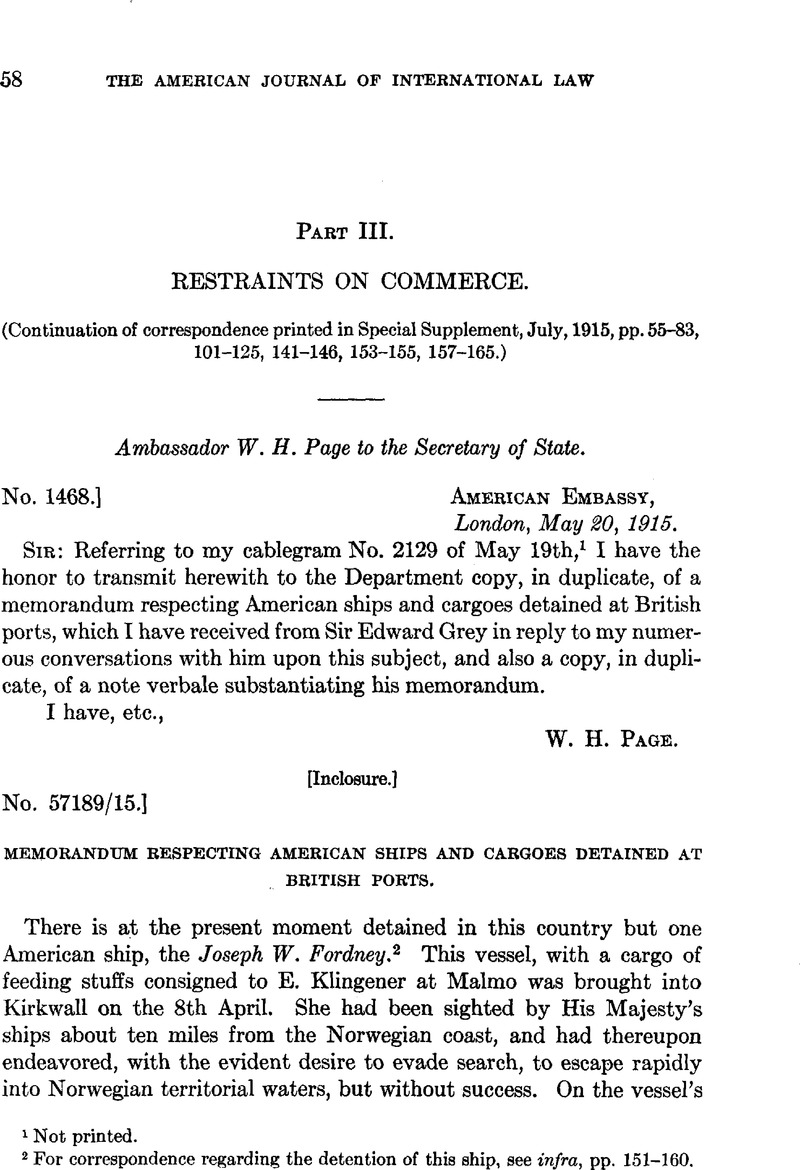No CrossRef data available.
Article contents
Part III. Restraints on Commerce
Published online by Cambridge University Press: 04 May 2017
Abstract

- Type
- Other
- Information
- Copyright
- Copyright © American Society of International Law 1916
References
page 58 note 1 Not printed.
page 59 note 2 For correspondence regarding the detention of this ship, see infra, pp. 151-160.
page 60 note Printed in Special Supplement, July, 1915, p. 162.
page 66 note * Or 20.5 per cent.
page 66 note † Or 68.6 per cent.
page 69 note 1 Received at the Department of State October 12, 1915.
page 69 note 2 The text of the decision of the British Prize Court in these cases is printed in the American Journal of International Law for October, 1915 (Vol. 9), p. 979.
page 70 note 1 Special Supplement, July, 1915, pp. 60, 65, 141, 157, 162, 163.
page 70 note 2 Supra, pp. 63, 64.
page 107 note 1 Not printed.
page 113 note 1 Not printed.
page 117 note 1 American consular agent at Kirkwall.
page 117 note 2 American consul at Dundee.
page 120 note 1 Supra, p. 73.
page 123 note 1 Unauthorized Translation of Paragraph 8 of The British Memorandum.
Naval practice, as it formerly existed, consisting in searching ships on the high seas, a method handed down to us by the old navy, is no longer adaptable to the conditions of navigation at the present day. Americans have anticipated its insufficiency and have foreseen the necessity of substituting some more effective method. In the instructions issued by the American Navy Department, under date of June 20, 1898, to the cruisers of the United States, the following order is found (clause 13) :
“If the latter (the ship’s papers) show contraband of war, the ship should be seized ; if not, she should be set free unless by reason of strong grounds for suspicion a further search should seem to be requisite.”
Every method must be modified having regard to the modifications of material which men have at their disposal, on condition that the method remains humane and civilized.
The French Admiralty considers that to-day a ship, in order to be searched, should be brought to a port whenever the state of the sea, the nature, weight, volume, and stowage of the suspect cargo, as well as the obscurity and lack of precision of the ship’s papers, render search at sea practically impossible or dangerous for the ship searched.
On the other hand, when the contrary circumstances exist, the search should be made at sea.
Bringing the ship into port is also necessary and justified when, the neutral vessel having entered the zone or vicinity of hostilities, (1) it is a question, in the interests of the neutral ship herself, of avoiding for the latter a series of stoppages and successive visits and of establishing once for all her innocent character and of permitting her thus to continue her voyage freely and without being molested; and (2) the belligerent, within his rights of legitimate defence, is entitled to exercise special vigilance over unknown ships which circulate in these waters.
page 124 note 1 Navy Department, General, No. 492, “Instruction to Blockading Vessels and Cruisers,” paragraph 13.
page 128 note 1 Page 64, supra.
page 128 note 2 Not printed.
page 134 note 1 See Special Supplement for July, 1915, p. 157.
page 145 note 1 Not printed.




